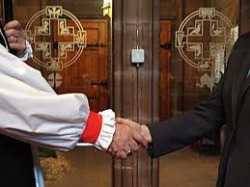The Power Of Accountability of the Five Fold


 In my last bog I asked, “How can the Church prepare, equip, prepare its saints for the ‘next’ group of false prophets, false teachers, self-proclaimed evangelists and apostles all under the title of ‘pastor’ or elite Church leader?
In my last bog I asked, “How can the Church prepare, equip, prepare its saints for the ‘next’ group of false prophets, false teachers, self-proclaimed evangelists and apostles all under the title of ‘pastor’ or elite Church leader?
I have been a Christian for 50 years now, and I have witnessed the rise and fall of several well known, once famous Christian leaders who have risen in power, influence, and affluence, only to tragically fall in shame and disgrace hurting thousands of Christian believers. Most of these men were very sincere in their Christian faith and beliefs, often starting as humble men, servants, doctrinally sound, but as they grew in stature gaining positions of influence and proclaiming titles and offices, rising up the corporate ladder of the Christian Church, subtle changes began to occur. Once they gained the “titles” and “offices”, they began to immune themselves from other Christians, particularly those of “lower position”. They felt “empowered” to “lead” those of less or lower caliber in the family of faith. Soon they became hard to “get to”, particularly for the common believer. They had build a cocoon of protection through isolation, self Bible study, individual meditation, and private worship, building even a greater distance between themselves and the “people” of God, their supposedly family. Soon those “people” would only be needed to “finance” the teachings, the ministry, and their affluence of their leader. Red flags begin to appear, but who is to stop this leadership, reprimand, correct, or guide this independent leader to bring accountability to his ministry, cause, or platform?
 The emphasis of the “Body of Christ” is its “many members”, different parts, different gifting, different talents, different points of view all working “together” for the “unity” of the Spirit of Jesus Christ. Its emphasis is not on one man, nor on just leadership. Ephesians 4 calls us to “equip the saints”, not the staff, not just the leadership. We are to “equip” the “body of Christ” for the “work of service”, not control, not position, not influence or affluence. We need to “equip” or prepare the “saints”, individual members, for “group”, “body”, ministry, not isolated individual ministry for the purpose of “maturing” the saints into the “likeness of Jesus Christ” while bringing “unity” to the “body of Christ”.
The emphasis of the “Body of Christ” is its “many members”, different parts, different gifting, different talents, different points of view all working “together” for the “unity” of the Spirit of Jesus Christ. Its emphasis is not on one man, nor on just leadership. Ephesians 4 calls us to “equip the saints”, not the staff, not just the leadership. We are to “equip” the “body of Christ” for the “work of service”, not control, not position, not influence or affluence. We need to “equip” or prepare the “saints”, individual members, for “group”, “body”, ministry, not isolated individual ministry for the purpose of “maturing” the saints into the “likeness of Jesus Christ” while bringing “unity” to the “body of Christ”.
We need to teach the saints the importance of their “new birth” in Jesus Christ, what it means, how it impacted their lives, how to share and tell their story, and how to build “relationships” with non-believers in Jesus Christ, so we can share the “good news”, the gospel. Then we need to “release” their evangelistic passion under proper accountability of service not control.
We need to teach the saints the importance of “nurture” and “care” in Jesus, how to have a shepherding heart, how to release hospitality to the sick, the afflicted, the poor, the hungry, the wondering, the unemployed, those released from prison or still in prison. When major disasters hit, like hurricanes, tornadoes, earthquakes, etc., American’s respond generously. We need to respond daily to the needs of those around us, not just during disasters. Finally we need to “release” the saints to “serve”, not as a project, nor a program, nor an evangelistic effort, but as a common everyday life.
We need to teach the saints the importance of daily devotions and Bible reading, teaching the saints discipline themselves to the “manna” of our day, teaching them to allow the Holy Spirit to be their teacher while speaking to them the truth about the passages they read. We need to teach the saints on how to “dig” for answers in the Bible, how to do effective Bible study. Then we need to “release” them to share the Word with others.
We need to teach the saints the importance of making that Logos, written Word, the Bible, into the Rhema Word, the living Word, living out the principles taught in the Bible in their daily lives. We need to take the saints from a theological, academic dissertation of the Bible into a practical, daily, experiential, living out of the Bible through the guidance of the Holy Spirit. We are to not only “talk” the “talk”, but “walk” the “walk.” Actually we need to “walk” the “talk”, experience the life, the journey, in Jesus. Then we need to “release” the saints to actually live out their faith journey in Jesus through the Holy Spirit of Jesus Christ.
We need to teach the saints the importance of “Body Ministry” and the “seeing over”, or oversight of the Body. What we do is for the common good of the body, the Church, not ourselves. Jesus “died” for the Church, we need to “lay down our lives for our brethren.” (I John 3:16) The five fold is not only for the “maturing” of the saints into the likeness of Jesus, but also to bring “unity” to the Body of Christ. The gospel is about “dying to self” in order to “lay down our life” through service to our brethren, our family members of faith through Jesus. It is not about “me”, #1 as we say in America, but about “us”, the Church, the body of Christ. After we equip the saints towards this endeavor, we then need to “release” them to bring that unity.
 Finally, if each of the five fold passions and points of view would subject themselves to serve the other four and be served by them in their daily lives and faith journeys, there would be established a powerful bond of accountability to serve and be served, preventing the isolation, inwardness, self-seeking, proclaimed self-enlightenment, independent spirit that has brought down so many Christian leaders in the past.
Finally, if each of the five fold passions and points of view would subject themselves to serve the other four and be served by them in their daily lives and faith journeys, there would be established a powerful bond of accountability to serve and be served, preventing the isolation, inwardness, self-seeking, proclaimed self-enlightenment, independent spirit that has brought down so many Christian leaders in the past.
If there was ever a time the Church needs the five fold, it is now!
































































